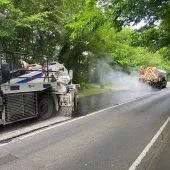Transport associations reject LGA pothole claims

FTA and RHA say lack of investment, not freight transport, is to blame for poor state of Britain’s roads
THE Freight Transport Association (FTA) and Road Haulage Association (RHA) have reacted with disappointment to the Local Government Association (LGA)’s claim that freight transport is responsible for the poor state of Britain’s roads.
According to the LGA, which represents more than 370 councils in England and Wales, pothole levels are likely to surge because of a spike in the number of heavy lorries wearing down roads.
It argues that the heavier the vehicle the more pressure is likely to be exerted on road surfaces, causing them to crumble quicker and form potholes.
Councillor Martin Tett, transport spokesman for the LGA, said: ‘Our local roads network faces an unprecedented funding crisis and the latest spike in lorries could push our local roads network over the edge. Lorries exert massively more weight on road surfaces than cars, causing them to crumble far quicker.’
However, the FTA says the LGA’s argument is inaccurate and incorrect, and the real issue is the need for increased funding from central government to address the potholes problem nationwide.
It has called for a reversal of the downturn in spending on local infrastructure, which, it claims, has caused a 14-year backlog of repairs across the national road network.
‘Freight levels on our roads are still not back to the pre-recession totals of 2006,’ said Christopher Snelling, head of policy at the FTA, ‘so the LGA’s assertion that HGVs are solely responsible for the increased number of potholes on Britain’s roads is incorrect.
‘It also indicates a clear lack of understanding of the impact of freight vehicles. Larger lorries do not cause increased damage to the road surface – in fact, they have more axles that spread payloads more evenly.
‘When combined with road-friendly twin tyres and road-friendly suspension, this reduces the impact of road usage by lorries.
‘Moving to a greater number of smaller vehicles would not ease the problem, but would simply compound the impact on an already weakened infrastructure,’ said Mr Snelling.
He continued: ‘For the LGA to make this sort of statement, instead of discussing the issue with the freight industry, is simply a cheap attempt to make headlines and pass over responsibility for an issue which sits in their remit.
‘The real issue is the need for increased funding from central government to address the potholes problem nationwide. Local authorities are facing large bills – one-off costs of approximately £69 million per council – to bring their roads up to a reasonable condition.
‘If local authorities are not able to spend enough to do this now, then the FTA wants to work with the LGA in securing more support from national government to address the problem.
‘The transportation of essential goods on our roads is crucial to the continued health of the economy, and to claim that lorries are the cause of the potholes across the country is simply not true.
‘We call on government to make a significant investment to ensure that British business can keep moving smoothly, without potholes.’
In a similar vein, the Road Haulage Association (RHA) said the haulage industry was being made a scapegoat to cover decades of underinvestment in road maintenance by infrastructure providers.
RHA chief executive Richard Burnett commented: ‘Local authorities have failed to maintain their infrastructure. Maintain roads properly and repair them after the installation of pipes and cables, and there will be few problems with potholes.
‘Failure to do so will see problems multiply.’
According to the RHA, many other European countries have far better road surfaces than the UK, despite facilitating the movement of hundreds of thousands of HGVs.
In addition, it says there are an increasing number of 60-tonne lorries operating on continental roads causing very little, if any, damage to the road network.









